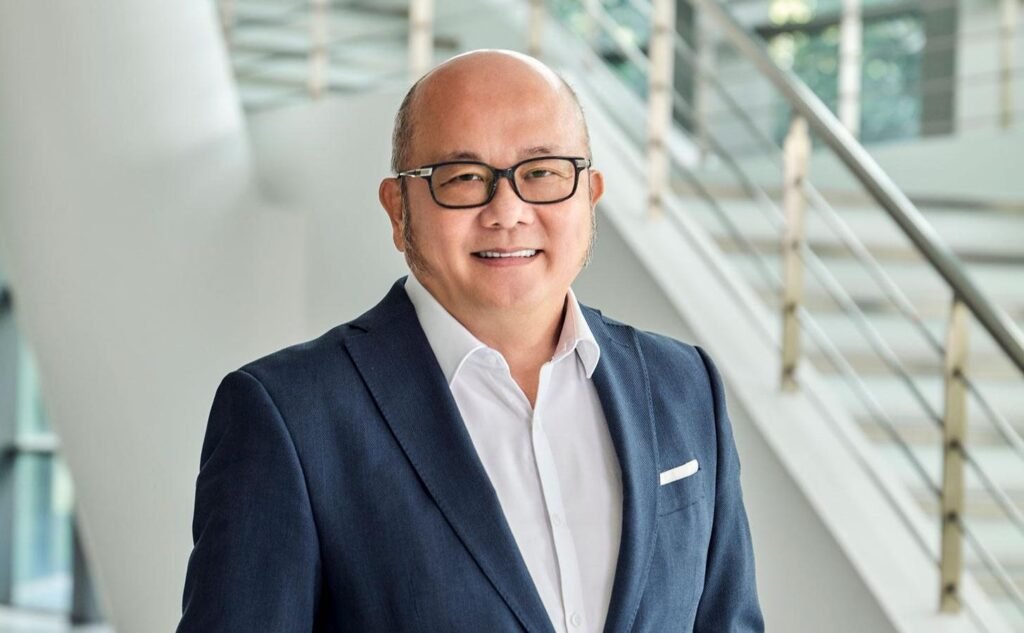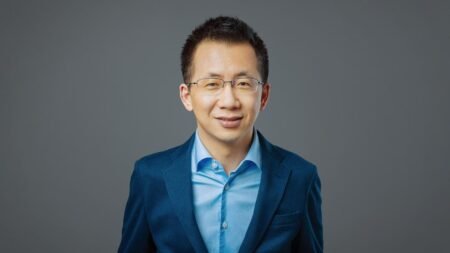Ron Sim’s V3 Group is stepping up global expansion with century-old Moroccan brand Bacha Coffee and TWG Tea.
By Jonathan Burgos, Forbes Staff
Bacha Coffee at Singapore’s iconic Marina Bay Sands is wedged between Armani and Zara stores. Square tins of coffee beans adorn the café’s walls from floor to ceiling in eye-popping shades of saffron—the most expensive of which is Paraiso Gold from Brazil that retails at Bacha for S$1,100 ($840) per 100 grams. As customers sip their 100% Arabica coffee—of which there are over 200 varieties—and nibble on Comté cheese croissants, they can ponder digging a little deeper into their pockets for, say, a gold-plated metal and glass Sultan coffee pot selling for S$3,899.
Getting a table at Bacha usually involves waiting in line and those impatient for their caffeine fix can try their luck just around the corner at the TWG Tea store, styled as an English tea room and with wall-to-wall displays of yellow tea tins. Here, TWG sells Imperial Gyokuro green tea from Japan when in stock for S$1,271 per 50 grams.
“We are not just any coffee or tea shop,” says Ron Sim, whose privately held V3 Group owns and operates both chains. “We‘re building premium brands.” Sim is no stranger to creating much sought-after, high-end products. Bacha is a more recent addition to his brand portfolio, best known for its plush and pricey Osim massage chairs, whose stores once populated malls across the region and earned him his billionaire status a decade ago. While that legacy business has flagged since those heydays, the addition of caffeine to his portfolio has perked things up.
Today, Sim derives his estimated fortune of $1.6 billion from diverse business interests, including health supplements, store fixtures and real estate. He oversees this portfolio from V3 Group’s headquarters in an industrial suburb of Singapore, far removed from the city-state’s dazzling storefronts. These days, V3’s chairman is obsessed with creating brands with universal appeal, especially among the young and affluent, that can be scaled up and expanded into other countries.
Two years ago, Sim earmarked $100 million to bankroll a global push. Most of that has already been spent on rolling out Bacha stores across Asia, Africa, the Middle East and Europe, bringing the total to 24 in nearly a dozen countries. “Bacha is a big success,” says Sim. “We’re going to grow it a lot faster.” Sim plans to have more than 100 stores by 2030 and is confident that the chain will generate enough cash flow to fund the expansion.
A more than century-old brand of Moroccan origin, Bacha Coffee was inspired by the Dar El Bacha palace in Marrakech, built in 1910 as the residence of the erstwhile governor. Closed after World War II, the palace was reopened in 2017 as a museum, and Morocco’s King Mohammed VI invited Sim’s French-Moroccan business partner Taha Bouqdib, cofounder of TWG Tea, to open a cafe inside the museum.
While recreating the Bacha Coffee Room & Boutique in its original location in Marrakech, Bouqdib was convinced of its broader appeal. “When I first saw the palace in Morocco, I thought, ‘How can I take the palace to the world?’” says Bouqdib. “That’s what we bring to every store, we create the palace experience.” The original Marrakech cafe had hosted notable figures from Franklin D. Roosevelt and Winston Churchill to Charlie Chaplin. Today it continues to draw celebrities such as American basketball legend Michael Jordan, who visited the Marrakech store last year.
Bouqdib secured the global franchise from Morocco’s National Foundation of Museums, which manages the palace museum, and sprung into action. In 2019, Bacha’s first overseas store was opened in the upscale Ion mall in Singapore’s Orchard Road shopping precinct. When Covid-19 brought the world to a halt the following year, it bled money. Taha pitched Bacha’s potential to Sim, who got sold on the idea. The Bacha franchise is now majority owned by Sim, who acquired it for an undisclosed sum and housed it within V3 Gourmet—Bouqdib, who has a minority stake, runs it as president and CEO—a part of group unit V3 Brands.
In 2022, seven more Bacha stores were opened in Singapore, including the largest, The Arch, a 650-square-meter coffee boutique in the duty-free zone of Changi Terminal 3, built for $10 million. This and the three other shops at Changi have become a popular pit stop for travelers seeking last-minute gift purchases, says Bouqdib, adding that retail and distribution account for about 70% of sales.
Was that risky timing? “I’ve been in business for 45 years and we’ve basically bounced back very quickly from every crisis we’ve experienced,” Sim replies. “In every crisis I would always take the opportunity to correct and consolidate and then ensure that we grow much faster.” The bet paid off. Bacha Coffee posted its first-ever net profit of S$2.2 million in 2023 on revenue of S$96 million, up 146% from the previous year, according to regulatory filings.
“We are delighted by what Ron has created, along with his management team and partners,” says Prashant Kumar, Singapore-based partner and head of Southeast Asia of private equity firm KKR, which in 2018 agreed to invest up to S$500 million for a minority stake in V3 Brands in a deal that valued it at S$1.7 billion. “It’s a phenomenal set of brands across his gourmet business [TWG and Bacha] and Osim massage chairs. The brands continue to be really strong.” (Neither Sim nor KKR were willing to disclose how much V3 Brands is valued at today).
Sim hit the sweet spot with Bacha, agrees Singapore-based Nirgunan Tiruchelvam, head of consumer and internet research at Aletheia Capital. “They’ve got the taste and packaging right and they’ve got the old-world opulence vibe that resonates well with consumers,” he says. “People are willing to pay a premium for that.”
S
im’s Chinese name Chye Hock means “fortune” and “luck.” After quitting high school in 1979, he sold household appliances through a company called R. Sim Trading. Years later, he changed the name to Osim—the “O” stands for the globe followed by his surname—and focused on massage chairs and other health and lifestyle equipment, which appealed to a more-affluent class of customers. He realized early that he needed to grow overseas because Singapore is such a small market, often referred to as “the little red dot.”
Over four decades, Sim has been carving out a niche in the global market for Osim massage chairs, which mimic shiatsu massage, notching up success in markets like China, but with one major stumble. After taking Osim public in 2000, selling over 25% of its shares in an IPO that valued the company at just S$71 million, Sim learned a costly lesson when Osim, in partnership with Singapore sovereign wealth fund Temasek and Boston-based private equity firm J.W. Childs Associates, paid $450 million in 2005 to buy U.S. specialty retailer Brookstone. (The same year, Osim featured on Forbes Asia’s Best Under A Billion list of companies with revenue under $1 billion.) While the acquisition enabled Osim to sell its chairs in almost 300 U.S. stores, Brookstone went bankrupt in 2014 and Osim took an over S$100 million writedown. In 2016, Sim, in a calculated move, took Osim private at a valuation of S$1 billion, delisting it from the Singapore Exchange, after which he regrouped his business under V3 (the name stands for Vision Three).
Sim says the Brookstone episode taught him not to make highly leveraged acquisitions. At the same time, he used the crisis to consolidate and reinvent the massage chair business. Osim’s current network of over 400 stores in almost 100 cities across 25 countries is about half of what it was 20 years ago when it bought Brookstone. Sim explains that the store network has been optimized and while online sales now account for about 10% of revenue, Osim will retain its brick-and-mortar presence so customers can try the products.
Today, Osim’s top-of-the-line massage recliner, uDream Pro Well-Being Chair, retails for S$10,999, and claims to be the market leader in China, Malaysia and Singapore. In recent years, Osim broadened its product lineup to include the uDiva massage sofa and a gaming chair with a massage function. “That’s our way of connecting with the younger crowd,” Sim says, adding that the pandemic gave a big boost to sales.
The recent economic slowdown in China, which accounts for about 25% of Osim’s annual sales of massage chairs, has hurt. Net profit slumped 56% year-on-year to S$28.4 million in 2023 and revenue declined 27% to S$312.4 million. Sim still believes in the world’s second-largest economy saying that it’s going through a temporary rough patch. Demand for massage chairs remains robust, with global industry sales expected to nearly double to $8.7 billion by 2030 from $4.5 billion, according to New Delhi-based research firm Markets & Data.
But it’s the coffee and tea business for which Sim has bigger plans. It’s among the fastest-growing categories in the beverage industry with revenue expected to grow 6% to $126 billion this year and touch $159 billion by 2028, according to Tokyo-based research firm Global Information. Rising demand for coffee and tea can be attributed to an increasing consumer appetite for healthier drinks, says Rohit Agarwal, managing director of Singapore-based private equity firm Peak XV, which has invested in Indonesian coffee chain unicorn Kopi Kenangan.
In August, Bacha completed a new coffee processing factory in Morocco that’s eight times the size of the existing plant in Singapore. Built at a cost of over $10 million, the new factory occupies a 1,000-hectare site, and Bouqdib says it can support the brand’s continuing expansion in Europe and the Middle East as well as a planned entry into the U.S. market in 2025. Later this year, a 1,500-square-meter Bacha store is set to open in Paris on the Champs Elysee. “We have customers from France who visit our Marrakech store,” explains Bouqdib.
Bacha’s sister brand TWG is bubbling too; net profit rose 8% year-on-year to S$4 million in 2023 as revenue jumped 63% to S$132 million, according to regulatory filings. Sim first invested in TWG in 2011, betting that tea would appeal to the same customers buying his massage chairs. Three years later, he took control of the company and landed in a legal dispute with its other cofounder, which he eventually won. TWG currently has 79 outlets in 18 countries, up from 10 stores in 2011. Sim has plans to increase TWG’s store count to 100 as well.
At 65, Sim says he isn’t slowing down. “I’m still hungry,” Sim says. “I’m pushing for growth.” While his three children are all involved in the business, learning the ropes and being prepared to take over one day, Sim has no plans to retire in the near future. “What will I do when I retire?” he quips. Investor KKR is betting on him for the longer term. Kumar says they are enthused by the growth opportunity presented by Bacha and TWG. “We have long term capital,” Kumar says. “It gives us the opportunity to exit at the right point of the cycle.”
A listing of V3 isn’t on the cards at the moment, Sim says. In 2018, Sim had pulled back a proposed IPO of V3 Brands in Hong Kong citing market volatility and opted for the private equity deal. Four years later, he filed a preliminary prospectus but chose to postpone the listing again as the indicative valuation didn’t meet expectations. Now, he insists, he’s focused on building the business. “All our brands are growing.”
Standing Tall
A longtime investor in real estate, Ron Sim’s most notable holding via his group’s V3 Assets is a 15% stake in Perennial Holdings, the Singapore-based property developer he co-owns with palm oil billionaire Kuok Khoon Hong and Perennial executive chairman and CEO Pua Seck Guan. Privately held Perennial, which delisted in 2020, is forging ahead with marquee projects that look set to alter Singapore’s skyline.
Following the demolition of Temasek Tower, the former headquarters of the Singapore sovereign wealth fund, construction of the 63-story Skywaters mixed-use office, hotel and residential condominium complex, on the edge of Raffles Place in the central business district, is proceeding apace. Designed by Skidmore, Owings and Merrill and rising over 305 meters, it will be the Lion City’s tallest tower when completed by 2028.
Presales of residences are due to commence later this year. And V3’s executive chairman is confident the project will sell well despite softening demand for Singapore property amid government efforts to curb price increases. “As long as the economy grows, we’ll be okay,” Sim says. “That’s the brand premium for Singapore real estate.”
Perennial is also gearing up to redevelop the 1973 vintage Golden Mile Complex together with the Far East Organization and Sino Land, companies controlled by billionaire brothers Robert and Philip Ng. The joint venture has received government approval to transform the historic property into a mixed-use commercial and residential complex.
Meantime, after winning a S$72 million bid last year, Perennial is planning its first elderly-care facility in Singapore in the northeastern suburb of Serangoon. The project builds on Perennial’s experience of running such facilities in China.
“We will continue to enhance the integration and synergy of our real estate, medical care, healthcare, eldercare and hospitality businesses and capabilities,” Pua says in the company’s latest annual report. The company’s net profit more than tripled to S$29 million in 2023 from the previous year and revenue rose 25% to S$201 million.
Correction: Sept. 5, 2024
An earlier version of the timeline incorrectly stated that Ron Sim invested in Perennial Holdings in 2020.
Read the full article here

















